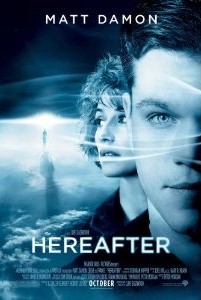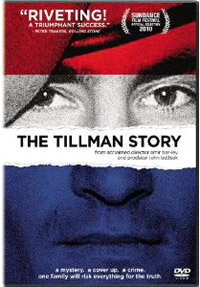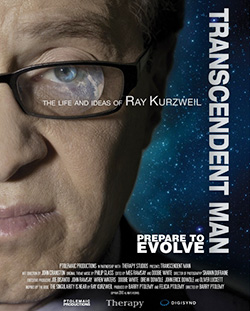A review of Clint Eastwood’s film Hereafter
/// ATTENTION! Spoiler Alert! ///

After a string of highly successful and critically acclaimed films by Clint Eastwood (Million Dollar Baby, Gran Torino, Invictus, Flags of Our Fathers, Letters from Iwo Jima, etc.), I fully expected his latest, Hereafter, to be so well written (screenplay by Peter Morgan—Frost/Nixon, The Queen) and so compelling that stories about near-death experiences would skyrocket and that I would be preoccupied for months dealing with media inquiries about “true stories” of the hereafter. Alas, and with some relief, this will not happen as Hereafter is possibly the worst film Eastwood has ever directed.
If the hereafter is anything like its filmic namesake, then it will turn out to be glacially slow, eternally boring, and pointless, with seemingly random plot lines aimlessly wandering about the ethereal landscape. I wanted to like this film, despite my skepticism on its subject, because I like Clint Eastwood productions and I’m a sucker for a well-produced story, able and willing to suspend disbelief long enough to get emotionally involved. I tried but failed to do so with this film. It’s a bomb. Don’t bother to see it in the theaters, and don’t even waste a couple of bucks on a Netflix rental.
The only redeeming part of the film was the striking opening scene of the tsunami in Southeast Asia that sets the background for the first plot line. An attractive French reporter leaves her lover in their hotel room to go shopping for his kids among the street vendors below. When he hears a disturbing sound and looks out the window he sees the ocean receding, followed by a massive body of water rushing back in to the shore and slamming into buildings and leveling everything in its path. From the woman’s street level view tucked in among buildings she can only see trees felling and chaos approaching with only enough time to realize that there is no time to do anything about it. She is swept up in the tsunami’s leading edge and slammed about cars, building debris, trees, and the like, until she is whacked on the head unconscious. Cut to minutes later when she is being given mouth-to-mouth resuscitation by rescuers, to no avail. They give up and move on to the next victim, whereupon she comes to life, after a brief encounter with the hereafter, which Eastwood portrays as a fuzzy, nebulous place with people walking about aimlessly. It’s a portent of things to come.
The second plot line is Matt Damon’s psychic character George, a former psychic who gave up fame and riches because his “gift” is also a curse. A cross between James Van Praagh and John Edward, George concedes to a reading for a client of his sleazy brother (Jay Mohr) and scores several hits. The brother encourages George to quit his job at a San Francisco dock and return to the psychic world, but he will have none of it as it’s just too emotionally traumatic to read people’s inner thoughts (that much I suspect is true, if any of it were true, which it isn’t). Matt Damon’s love interest is the beautiful Bryce Dallas Howard, whom he meets at a cooking class, but after nearly an hour’s worth of romantic buildup to some sort of coming together, she departs the film for good after George reads her and conveys the message that her deceased father is sorry for the naughty things he did to her as a young girl.
The third plot line develops around 12-year old twins named Marcus and Jason, who live with their drug-addicted mother in London, England. Jason is hit by a car and killed, leaving Marcus to wander about the city in search of a psychic who can connect him to his brother. Here at least Eastwood had the good sense to depict what most psychics are like—scammers and flimflam artists conning their marks out of a few bucks by talking twaddle with the dead through standard cold-reading techniques. Marcus is dismayed by the idiocy of these pretenders and finally returns to the foster home where he struggles to keep his sanity.
For an hour and forty-five minutes all three of these plot lines run parallel, leaving audience members to wonder when—oh please when?!—will they finally be brought together. Finally, after what feels like an interminable marathon of tedium, George quits his job and takes a vacation in London to visit the home of his favorite author, Charles Dickens. While there he notices a flyer for a lecture about Dickens at a book fair in London, where, per chance, the French reporter is doing a signing for her new book on life after death, which she was inspired to write after an hour and a half of futzing around with her mundane reporter’s job distracted by her experience with the hereafter in the tsunami. By chance, little Marcus finds himself drawn to the book fair where he recognizes George from his web page photos, and begs him for a reading, which he finally gets. Naturally, George is better than those phony psychics, and Marcus encourages George to seek out the French woman so that they may all connect to the dead. George and Marie find a love connection as well and the story ends happily ever after.
Never have I been so relieved for a movie to end. There was one memorable moment, however, and that was the opening line of the opening trailer before Hereafter even started. The trailer was for a January 2011 release called The Rite, staring Anthony Hopkins as an American priest who travels to Italy to study at an exorcism school. (You can watch the trailer here). The line that rather caught my attention as I was settling into my seat, was, “You know the interesting thing about skeptics?” To which I blurted out “No, what?” The answer: “It’s that we’re always looking for proof. The question is, What on earth would we do with it if we found it?” I know what I do with proof when I find it. I publish it! Another character in the trailer then says “I believe people prefer to lie to themselves than face the truth.”
Here, then, in this trailer is the message for belief in the hereafter. If there were proof of it, we would publish it to the high heavens. But, since there isn’t, most people prefer to lie to themselves about it rather than face the truth that it is what we do in this life that counts.





